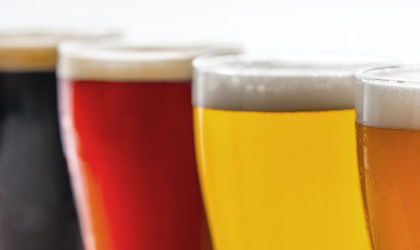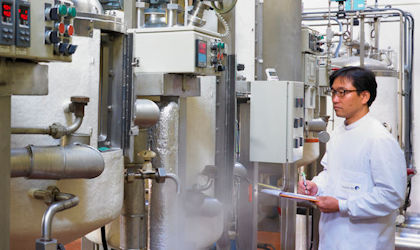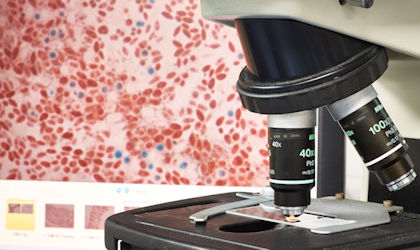Brewing microbiology
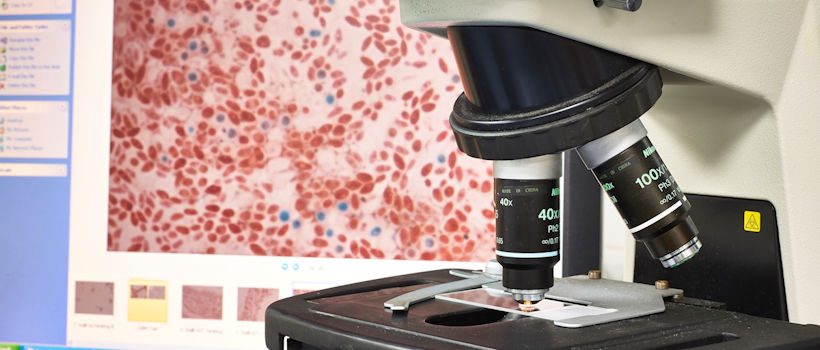
To discuss your needs
Brewing microbiology services we offer include:
- Brewing yeast management
- Fermentation research services
- Pasteurisation optimisation
- Cellar and dispense hygiene
- Microbiogical auditing
- Shelf-life evaluation
- Challenge testing
Brewing yeast management
Yeast storage – The best in yeast culture management, storage and despatch facilities to ensure our customers have a safe and stable deposit of their brewing yeast strains.
Yeast supply – Providing you with our yeast strains, either on an agar slope for your own in house propagations, or as a ready-to-pitch 5 litre propagation (including viability and cell count) in the form of a compact yeast slurry.
Contaminant screening – Specialist spoilage microorganism screening for slurry, fermentations, and final products (incl. keg, cask, can and bottle), to detect any hygiene and contamination issues in the brewhouse or packaging.
Yeast Karyotyping – Assessing your yeast strain’s long term stability, using ‘fingerprinting’ to monitor for chromosomal changes that could alter process performance and beer quality.
Flocculation tests – Help to investigate and measure how a new or established yeast strain aggregates, which is critical to yeast recovery.
Giant colony analysis – Investigating colony morphologies of isolates and their flocculation characteristics, to establish the different proportions of yeast strains present in a mixed culture.
Fermentation research services
The Campden BRI fermentation suite is a state-of-the-art facility for the investigation of all aspects of brewery fermentation. For example, our small scale reactors enable flexible and sophisticated control of a wide variety of operating conditions.
The suite is used for the following types of applications:
- Optimisation of any aspect of commercial yeast fermentation
- Evaluation of stress responses in yeast fermentation
- Feasibility studies for new product development
- Feasibility studies for new equipment development, e.g. on-line viable cell counters
- Evaluation of genetically modified yeast strains
- Development and optimisation of yeast propagation
- 'Vitality' testing of yeast populations
Any of these approaches can also be combined with our pilot plant facilities, our yeast molecular biology expertise and our comprehensive sensory science and analytical services in order to meet with your exact requirements.
Pasteurisation Optimisation
Our work has shown that effective pasteurisation for selected microorganisms in beer can be achieved at significantly lower PU values than those typically used and recommended within the industry.
To expand on this work, demonstrate the optimal level of pasteurisation for vegetative bacteria, yeast and yeast ascospores, and to address the lack of validated pasteurisation indicators for beers, we have developed and validated a pasteurisation bio indicator (yeast ascospores).
By performing optimisation trials, we offer pasteurisation optimisation for premium beers, low / no alcohol beers, wines, cocktails and any other low pH beverages.
Cellar and Dispense Hygiene
The importance of good cellar management is widely understood within the brewing industry and it has long been recognised that poor dispense hygiene is detrimental to beer quality. Many products and systems are now available in the market which claim to improve dispense hygiene and to save money.
The comparative evaluation of the efficacy of such systems is often carried out in operating bars where results maybe susceptible to many uncontrolled factors and where it is not always possible to incorporate essential measurements such as microbiological assays and sensory analysis.
In response to the industry's need to critically evaluate competing products, Campden BRI has established standard methods for evaluating cellar and dispense hygiene procedures.
- Does your cleaning chemical damage dispense components?
- Cleanability
- Taste taints and appearance
- Test in trade
Saccharomyces diastaticus screening – Rapid investigation of your product for the presence of S. diastaticus, with our GeneDisc PCR platform.
'Model' Biofilm and Test Protocols
Most hygiene problems associated within beer dispense systems are caused by the occurrence of a slimy coating of microorganisms, or, biofilm. To allow reproducible product evaluation, it is essential to be able to artificially generate such a biofilm. We have generated such a system for evaluating the cleanability and hygienic design of dispense systems or components. We can conduct comparative studies to evaluate the efficacy of cleaning procedures, agents and preventative equipment.
Microbiological auditing
Risk management is critical to business success. Poor hygiene standards ultimately result in product spoilage leading to expensive product recall and damage to a brand image.
Campden BRI's microbiological auditing service is specifically designed to minimise this risk, thus:
- Reducing costs of trade returns
- Improving product quality and consistency
- Enhancing customer image through independent impartial auditing
Shelf-life evaluation
We offer shelf-life testing, including challenge testing.
We take a holistic approach to shelf-life that provides insight into all aspects of the product. We can assess how your product performs over time and identify the changes to ingredients, packaging or to other contributory factors that will help lengthen shelf-life across a variety of product types, to deliver results you can trust.
Challenge testing
Our microbiologists are experts at challenge testing all types of food and drink, both for pathogens and spoilage organisms. We have the knowledge of the correct processing and preservation systems, availability of predictive models and for the definitive answer, the use of the best challenge testing protocols and experience available.
We have developed techniques to aseptically drill tiny holes in cans to quickly introduce the challenge organism. The hole is then sealed with a sterile metal rivet, minimising any change to the conditions within the can. The drink remains carbonated, excess oxygen is not introduced and the rivet can withstand the internal pressure of carbonation and any additional pressure that may build up from fermentation in case the challenge organism is capable of growth.
The cans can be incubated for any length of time or at any temperature and finally opened and examined microbiologically to establish if growth has occurred. This procedure gives the very best method for the realistic challenge testing of carbonated drinks cans, eliminating the problems of previous methods and adding further to our expertise in challenge testing.
Key contact

About Grzegorz Rachon
Grzegorz (Greg) is a microbiology expert who has been in the food industry since the early 2000s, and has been working at Campden BRI since 2016. He has PhD from Reading University and Birmingham University, as well as extensive expertise in pasteurisation optimisation of beverages, process validation, and stability of traditional and novel beverages.
Key services
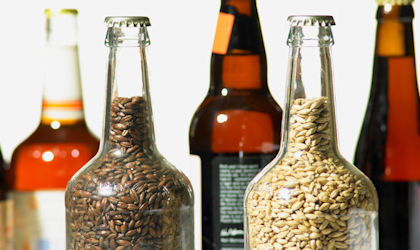
Beer, barley and malt analysis
Standard analyses and due diligence analyses for beer, malt and barley.
Submit a sample
For guidance on how and where to send samples, please see our sample guidance page
Brewing training courses
Explore our brewing related courses including; Brewing – an introduction and HACCP for craft brewers
Where we refer to UKAS Accreditation
The Campden BRI group companies listed below are accredited in accordance with the recognised International Standard ISO/IEC 17025:2017 by the United Kingdom Accreditation Service (UKAS). The accreditation demonstrates technical competence for a defined scope of methods, specific to each site, as detailed in the schedules of accreditation bearing the testing laboratory number. The schedules may be revised from time to time and reissued by UKAS. The most recent issue of the schedules are available from the UKAS website www.ukas.com. Campden BRI (Chipping Campden) Limited is a UKAS accredited testing laboratory No. 1079



